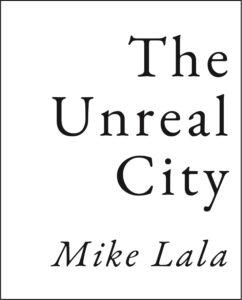Today’s special guest is poet Mike Lala and we’re chatting about his newest collection, The Unreal City (Tupelo Press, 2023).

Bio:
Mike Lala is a poet and performance writer in New York City. He is the author of The Unreal City (Tupelo Press, 2023), Exit Theater (Colorado Prize for Poetry, 2016) and several chapbooks and performances. His poems and translations have appeared in A Public Space, American Poetry Review, BOMB, Boston Review, Fence, The Brooklyn Rail, Denver Quarterly, New American Writing, the PEN Poetry Series, and Tales of Dionysus (Univ. of Michigan Press, 2022).
Welcome, Mike. What do you enjoy most about writing poems?
For a long time, my writing life was marked by difficulty, then a subsequent attempt at overcoming that difficulty through control. Part of this is related to the fact that I have always been a working writer whose time has been short—I have an hour or two in the morning, which is time to act, not sit. I took pleasure in moving through dozens of iterations of a single word or line quickly, leading to dozens of drafts of the poem itself, in a sort of compulsive way that is perhaps unsustainable.
But as I began to trust myself as a writer, I started to learn how to be in that trust—to sit in advance of a word or line, to let its absence fulminate in anticipation of presence and ultimately the emergence of an idea or phrase. This process builds on itself and can culminate in a flow state that is painful to leave, but is ultimately the most pleasurable thing in my life.
Can you give us a little insight into a few of your poems – perhaps a couple of your favorites?
There is a poem in The Unreal City called “1982,” which you can read in BOMB magazine. The poem is a long meditation on absence related to something never happening: to my never becoming a specific type of person whom at one point it was possible to become—and so a meditation on regret.
Formally the poem looks like a long folding screen (here is one of my favorites), and what it describes is a landscape painting populated with cultural figures I might have painted, had I become a painter. And, impossibly (in keeping with this theme) there is a music video playing out inside the painting. The song for which the video was made is “Avalon” by Roxy Music – Avalon of course being a mythical place associated with Anglo-Saxon legend, and so the poem becomes at once a meditation on a person never realized, art never made by that person, and the fantasies of a culture that could have produced that person, all embodied in a winding poem that critiques a never-made landscape painting and a popular music video that is itself about fantasy.
What form are you inspired to write in the most? Why?
I don’t write in particular poetic forms. My job is to help the poem edge toward itself in form.
What type of project are you working on next?
I have a recently completed book of variations on Catullus poems called The Catullus Variations, and am working on a new performance with my collaborator Iris McCloughan about the ghosts of friends, neighborhoods, and ourselves.
When did you first consider yourself a writer / poet?
Probably in my early 20s. Before that, I resisted it adamantly.
How do you research markets for your work, perhaps as some advice for not-yet-published poets?
I read magazines at home and at bookstores, and send places that publish work that feels adjacent to mine, and I read other poets’ books, and look where they publish.
What would you say is your interesting writing quirk?
I don’t like fancy words.
As a child, what did you want to be when you grew up?
A marine biologist (I loved, and still love, dolphins and whales, whose model of language is radically different from ours).
Anything additional you want to share with the readers?
Just my thanks for reading. Thank you.
